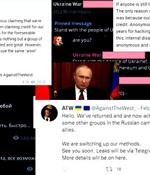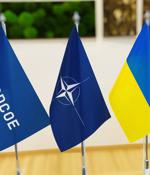Security News

Cyber criminals and hacktivist groups are increasingly using the Telegram messaging app for their activities, as the Russia-Ukraine conflict enters its eighth day. A new analysis by Israeli cybersecurity company Check Point Research has found that "User volume grew a hundred folds daily on Telegram related groups, peaking at 200,000 per group."

Charities and non-governmental organizations providing critical support in Ukraine are targeted in malware attacks aiming to disrupt their operations and relief efforts seeking to assist those affected by Russia's war. Amazon has detected these attacks while working with the employees of NGOs, charities, and aid organizations, including UNICEF, UNHCR, World Food Program, Red Cross, Polska Akcja Humanitarna, and Save the Children.

While Ukraine is yet to become a member of the North Atlantic Treaty Organization, the country has been accepted as a contributing participant to the NATO Cooperative Cyber Defence Centre of Excellence. Although this does not make Ukraine a NATO member, it will likely tighten collaboration and allow it to gain access to NATO member nations' cyber-expertise and share its own.

Cisco has joined the growing list of security and technology companies that no longer offer services in Russia after their invasion of Ukraine. Software companies are pulling out of Russia and ramping up their support to Ukraine in various ways.

Threat actors are distributing malware using phishing themes related to the invasion of Ukraine, aiming to infect their targets with remote access trojans such as Agent Tesla and Remcos. It is common for malware distributors to take advantage of trending global events to trick the recipient into opening email attachments, and at this time, there is nothing more closely watched than Russia's invasion of Ukraine.

Roskomnadzor, Russia's telecommunications watchdog, asked Google to stop advertising campaigns spreading misinformation about Russia's invasion of Ukraine on YouTube videos. "Roskomnadzor sent a letter to Google LLC with a demand to immediately stop disseminating false information of a political nature about the special operation of the Russian Armed Forces in Ukraine on the territory of Russia," the internet watchdog explained.

The Security Service of Ukraine said today "Enemy" hackers are using compromised local government and regional authorities' websites to push rumors that Ukraine surrendered and signed a peace treaty with Russia. "WARNING! ANOTHER FAKE! The enemy has broken into some sites of regional authorities and local governments and spreads through them lies about the alleged 'capitulation and signing of a peace treaty with Russia'," the SSU said, as Reuters first reported.

Ukraine has been at the center of an unprecedented wave of cyberattacks in recent weeks and months, from distributed denial-of-service campaigns against organizations and citizens to attacks against national infrastructure and more. This phishing targeted a very specific group of European government personnel involved in managing the outflux of refugees from Ukraine.

Avast has released a decryptor for the HermeticRansom ransomware strain used in targeted attacks against Ukrainian systems over the past ten days. Crowdstrike was quick to spot a weakness in the cryptographic schema of the GO-written strain and offered a script to decrypt the files encrypted by HermeticRansom.

The Ukrainian government attributed the activities to a threat actor tracked as UNC1151, a Minsk-based group whose "Members are officers of the Ministry of Defence of the Republic of Belarus." In a follow-up update, the agency said the nation-state group also targets its own citizens, while simultaneously setting its sights on Russian entities -. The development follows a barrage of data wiper and distributed-denial-of-service attacks against Ukrainian government agencies, even as various hacking groups and ransomware syndicates are capitalizing on the chaos to take sides and further their activities.